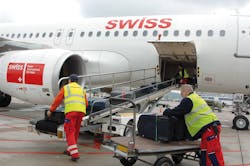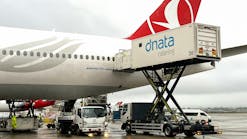Swissport Loses Out In Ukraine … For Now
Either Swissport International Ltd. was the victim of a corrupt legal process in Ukraine where judges still act like Soviet-era puppets who hold hearings that aren’t scheduled on any court docket, refuse to deliver legal briefs and mysteriously reassign themselves at the last minute, all to enable a hometown hostile corporate raider to pay $400,000 for a thriving $30 million business, including $8 million worth of GSE …
… or Ukraine International Airlines was the victim of an underhanded business deal, taken advantage of by a much larger, more famous company that turned the screws on its minority business partner right from the start and, finally, fed up with this hostility, but only after failing to get both sides to agree to “civilized principles,” decided to stand up and fight for its rights in a court of law.
Take your side, but both companies can agree that Swissport lost out in Ukraine, at least for now.
After almost a year of legal wrangling, a Ukrainian appellate court ruled on March 27 that Swissport had violated UIA’s minority shareholder rights, immediately stripped Swissport of its 70 percent outstanding stake in joint venture ground handler Swissport Ukraine and essentially handed it over to UIA for just 1 percent of the JV’s value.
“This hostile raider attack was based on alleged violations of formalities without legal grounds and now resulted, after an unfair judicial process, in this surprising loss of ownership,” Swissport stated in a press release.
After the verdict, UIA renamed the company Interavia (the original name of the ground service provider), and announced new management was deliberating on a business plan to run the company independent of the airline. Swissport cut off the Interavia from its corporate passenger servicing system and IT systems. The international ground handling company also stated it would fight the verdict and return to Ukraine.
LEGAL BASIS
UIA’s basis for legal action against its former partner was a claim that Swissport was violating its minority shareholder rights. Namely, Swissport wanted to further invest in the ground service provider to keep up with its double-digit growth – in fact, Swissport wanted to generously help up out the financially struggling UIA by throwing in more than its share.
That action, if unmet by any further capital from UIA, would naturally dilute the value of the airline’s stake in Swissport Ukraine.
From that point, either something happened or nothing happened – and “he said/he said” between the two partners turned into a multimillion-dollar misunderstanding and a very lop-sided court decision.
According to UIA, Swissport unilaterally voted in favor of increasing its investment into Swissport Ukraine at a shareholder’s meeting on March 6, 2012.
However, in a Swissport press conference held April 17 to discuss the case, the company said any talk of further investment in the business was just that – talk – and that a final vote on the matter would take place at a future shareholder’s meeting.
“Swissport was expressing its future will to further invest in the company’s future and to ensure continuous growth by financing the company even beyond obligations,” according to a presentation made at the press conference.
Based on a “mere discussion” of a future capital increase, UIA went to court, according to Swissport.
“It was not a discussion,” Evgeniya Satskaya, UIA’s corporate press secretary, told us by email after the airline held its own press conference on April 18. “On March 6, Swissport voted in favor of dilution of UIA’s shareholding in Swissport Ukraine.”
Satskaya also said that decision was against the rules. UIA subsequently sent a default notice to Swissport, but given the absence of any response UIA brought the action to court.
The airline's spokesperson added that UIA wanted to invest in the ground service provider.
“Investment has always been each party’s sole right,” Satskaya says. “UIA was willing to invest based on a long-term development strategy. But the parties were not able to agree due to different visions of future development for Swissport Ukraine.”
Swissport ended up losing its case in the first round before the Kiev City Economic Court and appealed the decision to the Kiev Economic Court of Appeals.
HIGH NOTE
No matter how the joint venture ended up, it certainly started out on a high note.
“Kiev becomes Swissport station number 175,” reads the headline of the press release Swissport posted after UIA sold a 51 percent share of ground handler Interavia to the company six years ago.
With annual operating revenue of $2.6 million handling some 12,000 flights, Interavia was the biggest ground handler at Borispol International Airport in 2006. The company expected to grow by 20 percent by just the following year and planned to expand to other airports.
“With its strong economic growth and its rapidly rising air travel volumes, Ukraine fits ideally into the Swissport strategy of gaining key footholds in promising new markets,” the press release adds.
At the start of the Swissport Ukraine JV, UIA held on to 29.4 percent and its original business partner, Airline Business Handling, kept a 19.6 percent stake.
Swissport, already providing ground handling for UIA at other airports, now had a prime position at KPB, UIA’s hub and the country’s largest airport serving its capital, Kiev.
“The market here offers phenomenal potential,” added Richard W. Creagh, UIA’s deputy president, in the press release. “And it’s not just governments, embassies and businesspeople who are demanding more and more mobility to and from the country; with the boom we are seeing in the local economy, more and more private individuals are travelling by air, too.”
At its March press conference, Swissport indicated the JV prospered until 2011 as Swissport Ukraine gained more customers and expanded to two other stations in Ukraine. By then, Swissport’s ownership in the ground service provider had grown to some 70 percent after buying out GHB in 2008.
But 2011 also marks a turning point in the JV when ownership in UIA changed hands to more private investors.
MR. MAYBERG
Or make that to one private investor.
Ukraine’s flag carrier was a state-run airline with foreign capital from its start in 1992. In 2011, the government sold its 61 percent stake to three existing minority shareholders with Aron Mayberg at the forefront.
Swissport takes the time to single out Mayberg, the airline’s main shareholder, in many of the statements the company has made during the lengthy judicial process and its aftermath.
Not much information can be found about Mayberg. For someone in charge of an airline, his bio and picture do not appear on UIA's Web site alongside the 15 other executives listed under its management team.
He did start AeroSvit in 1994, a Ukrainian airline that’s currently in bankruptcy proceedings with debts of $534 million, three times the value of its assets.
But from there, even 20 pages into a Google search produces no more than that he is a “Ukrainian businessman” and suffice to say he isn’t on LinkedIn either.
A story in the Kyiv Post, the country’s leading English-language newspaper, on the UIA sell-off does bare out at least some of the bargain basement deals that, in this case, the Ukrainian government rather its judicial system seems more than willing to dole out to those who can hear a the door knob turn on a back door whenever it opens.
The country’s State Property Fund ended up selling its majority share in UIA for about $31 million – not much for a company that booked $371 million in business the year before. There seemed a lot of controversy at the time that the fund had the power to hold an auction that might have fetched a higher price.
As the rules stood, minority shareholders had first dibs at buying up the airline, and Mayberg appears to have been first in line. Other long-time shareholders, such as Austrian Airlines and the European Bank for Reconstruction and Development, divested their shares in the process.
With Mayberg in control of UIA, his first decision was a curious one for an executive who also held a stake in a ground handler. Mayberg fired Swissport Ukraine and put the airline’s ramp handling and passenger handling contracts out for bid.
Oddly enough, but wouldn't you know it that Aerohandling, a ground handler Mayberg was once associated with, won the business despite concerns over the hallmark of a backroom deal – lower quality delivered at a higher price.
Even with this turn of events, Swissport was still ready to finance the growth of Swissport Ukraine. After all, the ground service provider seemed to be doing quite well even after losing the UIA account. The company had picked up business with 20 other airlines and customers, and expanded its stations to the country's major aviation sites:
- Kiev Zhuliany International Airport, Kiev’s other passenger airport and the country’s major business aviation airport.
- Kharkiv International Airport, serving the country’s second-largest city.
At its March press conference, Swissport said UIA struggled to meet its pro rata share obligations to support further growth right from the beginning of the JV.
When it came to dollars, according to Swissport, both organizations were committed to investing in the subsidiary under the participant’s agreement of the joint venture. When UIA balked at further investment, Swissport offered to provide all of the investment instead.
BAD BLOOD
While the March 6, 2012, undoubtedly triggered the legal action, according to a press release posted on UIA’s own Web site, the bad blood between the two companies started on Day One of the joint venture:
- Swissport acquired its UIA share at a fraction of the cost in 2006.
- Concurrently with sale and purchase a three-year ground handling services contract containing disadvantageous conditions was imposed upon the airline.
- The contract forced UIA to pay for Swissport Ukraine ground handling services at the tariffs significantly exceeding market prices.
UIA says that only after it became a privately-owned airline with Mayberg in charge did it get a voice in running the business.
“UIA entered into the deal aiming to acquire a reliable, decent and professional partner and to further share the profits,” the press release states. Only after numerous negotiations went nowhere, UIA says it offered its partner a “civilized divorce.”
Exactly what this divorce meant remains another mystery, although UIA says all its proposals were rejected.
As the case went through litigation, UIA says “Swissport strongly delayed the proceedings, deviated from providing documents and information on the actual circumstances of the conflict, and thus tried to mislead the court.”
Swissport, however, had a different experience, and during its March press conference gave examples of the erratic nature of the Ukrainian legal proceedings:
- The company did not receive proper notification from the court in one case.
- Court hearings were postponed several times and two judges were replaced at the last minute.
- In several cases, the company heard from its lawyers hours before the court hearing that the court decided against Swissport.
- As Swissport appealed a lower court decision, the company says the court refused to deliver written court rulings, hindering its lawyers’ preparations.
Other press accounts confirm Swissport’s telling – the appellate case, for example, had six scheduled court hearings, three of which were postponed and two of which saw the judge changed at the last minute.
In the end, the Kiev City Economic Court of Appeal commenced on March 27 and discussed the case for 90 minutes, apparently, without Swissport’s lawyers even present, and ruled against the company – a verdict Swissport says it did not even know about until the company received a written court ruling on April 5.
FIGHTING BACK
After originally saying it would not appeal the ruling, on April 16 Swissport appealed the case to the Economic Court, Ukraine’s highest such court for commercial cases.
“We are 100 percent convinced that Swissport is right and Ukraine International, along with its shareholders, are committing a crime and they have taken our shares in an unfriendly way,” Mark Skinner, senior vice president for Swissport Ground Handling – Europe, told Air Cargo News on April 21.
In the meantime, UIA sounds like a sore winner.
“We received Swissport’s cassation appeal only on April 22,” Satskaya said. “However, it is incomplete as it fails to contain any pleading. Therefore, such appeal is either generally invalid and as such will not be considered by the court or it is an attempt to hinder due process of law.”
But even Swissport knows its legal prospects are far from promising.
Caroline Bueth, Swissport’s senior legal consultant told Cargo Forwarder the chances of winning an appeal “is highly unlikely.” Why go on then? “Because we intend utilizing all judicial possibilities, although a fair trial seems not to be very likely, it cannot be completely excluded either,” she answered.
Swissport, after all a company with almost $2 billion in revenue with operations in 38 countries, is also applying political and diplomatic pressure on the case by asking for support from the president and vice president of the European Commission as well as members of the Ukraine delegation.
Also, Swissport informed both the Swiss and French embassies of the proceedings. (Swissport, headquartered in Zurich, Switzerland, is owned by PAI Partners, a French private equity firm.)
News of a private company stripped of its hard work for a token sum could cause foreign investors to shun Ukraine just as the country looks to integrate with Europe.
Government officials have indeed initialed free trade and other business agreements with the European Union. For example, the EU and Ukraine are currently negotiating a comprehensive open skies agreement allowing unrestricted air traffic. As part of these negotiations, the EU is putting pressure on Ukraine’s government to give up its protectionism and safeguard foreign property.
“UIA is not aware of the essence of any such requests,” Satskaya told us. “UIA has always trended to resolve the conflict in a legal rather than in political way. However, once relevant materials are available to UIA we’ll instruct our counsellors to evaluate those inter alia [too specify one example out of many possibilities} in terms of corruption shading.”
During its ill-fated appeal Swissport also sent a letter to IATA chief executive Tony Tyler, alleging that UIA is in financial trouble after the airline failed to pay Swissport for its business in Tel Aviv, Zurich and Geneva. The letter urged IATA to review the airline’s Operational Safety Audit program.
While Mayberg seems to keep a low profile, he did take part in the UIA press conference in March, and insisted that Swissport is trying to mix politics into the conflict by using its famous name and continued to take issue with any claim that UIA illegally seized Swissport Ukraine.
"We've sent a letter to Swissport International with a claim to deny the information,” he said. “If it is not denied, we'll protect our interests.”
Win, lose or draw, Swissport plans to re-enter the Ukrainian market – but, of course, not first before carefully vetting its future equity partners.
“We will continue to fight to get our company back and it is our intention to re-enter the Ukrainian market,” said Juan-José Andrés Alvez, executive vice president ground handling, Europe, Africa and Latin America for Swissport. “Should this not be possible under normal business conditions then the aviation industry will have failed to support and defend open competition and ethical business practices.”
In interviews with a number of publications, Skinner remains upbeat about the country’s commercial prospects.
“Ukraine offers great business opportunities in a very dynamic market environment,” he told The Load Star even before the appellate court reached its verdict “But at the same time, investors need to be aware that there are serious risks that they have to take into account.”
Rather than trying again at a joint venture, Skinner also raised a second option.
“We are still interested in doing business in Kiev and some other Ukrainian airports,” he told Cargo Forwarder after the appellate court effectively forced Swissport out of the country, “but would rather prefer a franchise partner running the handlng activities under our company’s name.”









